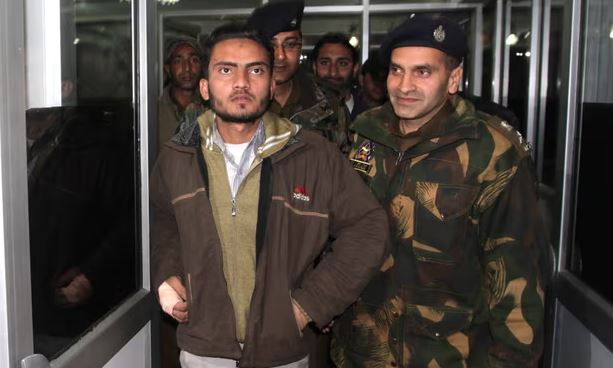- Web Desk
- 5 Hours ago
Indian govt ordered killings in Pakistan, intelligence officials claim
-

- Web Desk
- Apr 05, 2024

Allegations of up to 20 assassinations since 2020 follow Canada’s accusation of Delhi role in murders of dissidents
The Indian government assassinated individuals in Pakistan as part of a wider strategy to eliminate terrorists living on foreign soil, according to Indian and Pakistani intelligence operatives, said a report by the Guardian.
Interviews with intelligence officials in both countries, as well as documents shared by Pakistani investigators, shed new light on how India’s foreign intelligence agency allegedly began to carry out assassinations abroad as part of an emboldened approach to national security after 2019. The agency, the Research & Analysis Wing (Raw), is directly controlled by the office of India’s prime minister, Narendra Modi, who is running for a third term in office in elections later this month.
McDonald’s to buy back Israeli restaurants after boycotts
The accounts appear to give further weight to allegations that Delhi has implemented a policy of targeting those it considers hostile to India. While the new allegations refer to individuals charged with serious and violent terror offences, India has also been accused publicly by Washington and Ottawa of involvement in the murders of dissident figures including a Sikh activist in Canada and of a botched assassination attempt on another Sikh in the US last year.
The fresh claims relate to almost 20 killings since 2020, carried out by unknown gunmen in Pakistan. While India has previously been unofficially linked to the deaths, this is the first time Indian intelligence personnel have discussed the alleged operations in Pakistan, and detailed documentation has been seen alleging Raw’s direct involvement in the assassinations.
The allegations also suggest that Sikh separatists in the Khalistan movement were targeted as part of these Indian foreign operations, both in Pakistan and the west.
According to Pakistani investigators, these deaths were orchestrated by Indian intelligence sleeper-cells mostly operating out of the United Arab Emirates. The rise in killings in 2023 was credited to the increased activity of these cells, which are accused of paying millions of rupees to local criminals or poor Pakistanis to carry out the assassinations. Indian agents also allegedly recruited jihadists to carry out the shootings, making them believe they were killing “infidels”.
Muslim community snubs White House iftar dinner invite
Senior officials from two separate Pakistani intelligence agencies said they suspected India’s involvement in up to 20 killings since 2020. They pointed to evidence relating to previously undisclosed inquiries into seven of the cases – including witness testimonies, arrest records, financial statements, WhatsApp messages and passports – which investigators say showcase in detail the operations conducted by Indian spies to assassinate targets on Pakistani soil. The Guardian has seen the documents but they could not be independently verified.
In a response to the Guardian, India’s ministry of external affairs denied all the allegations, reiterating an earlier statement that they were “false and malicious anti-India propaganda”. The ministry emphasised a previous denial made by India’s foreign minister, Subrahmanyam Jaishankar, that targeted killings in other countries were “not the government of India’s policy”.
“This policy of Indian agents organising killings in Pakistan hasn’t been developed overnight,” said a Pakistani official. “We believe they have worked for around two years to establish these sleeper cells in the UAE who are mostly organising the executions. After that, we began witnessing many killings.”
Oil prices cross $90 as UAE cuts diplomatic ties with Israel
Pakistan’s foreign secretary, Muhammad Syrus Sajjad Qazi, publicly acknowledged two of the killings in a press conference in January, where he accused India of carrying out a “sophisticated and sinister” campaign of “extraterritorial and extrajudicial killings” in Pakistan.
Islamabad’s accusations were met with scepticism by others, due to the longstanding animosity between the two neighbouring countries who have gone to war four times and have often made unsubstantiated accusations against the other.
In September, the Canadian prime minister, Justin Trudeau, told parliament there were “credible allegations” that Indian agents had orchestrated the killing of Hardeep Singh Nijjar, a prominent Sikh activist who was gunned down in Vancouver. Weeks later, the US Department of Justice released an indictment vividly detailing how an Indian agent had attempted to recruit a hitman in New York to kill another Sikh activist, later named as Gurpatwant Singh Pannun.
Both men had been major advocates of the Khalistan movement, which seeks to create an independent Sikh state and is illegal in India. India denied any involvement in the killing of Nijjar, while according to a recent report, India’s own investigation into the Pannun plot concluded that it had been carried out by a rogue agent who was no longer working for Raw.
American embassy granted consular access for Adiala jail meeting
According to one Indian intelligence official, Delhi recently ordered the suspension of targeted killings in Pakistan after Canada and the US went public with their allegations. No suspicious killings have taken place so far this year.




